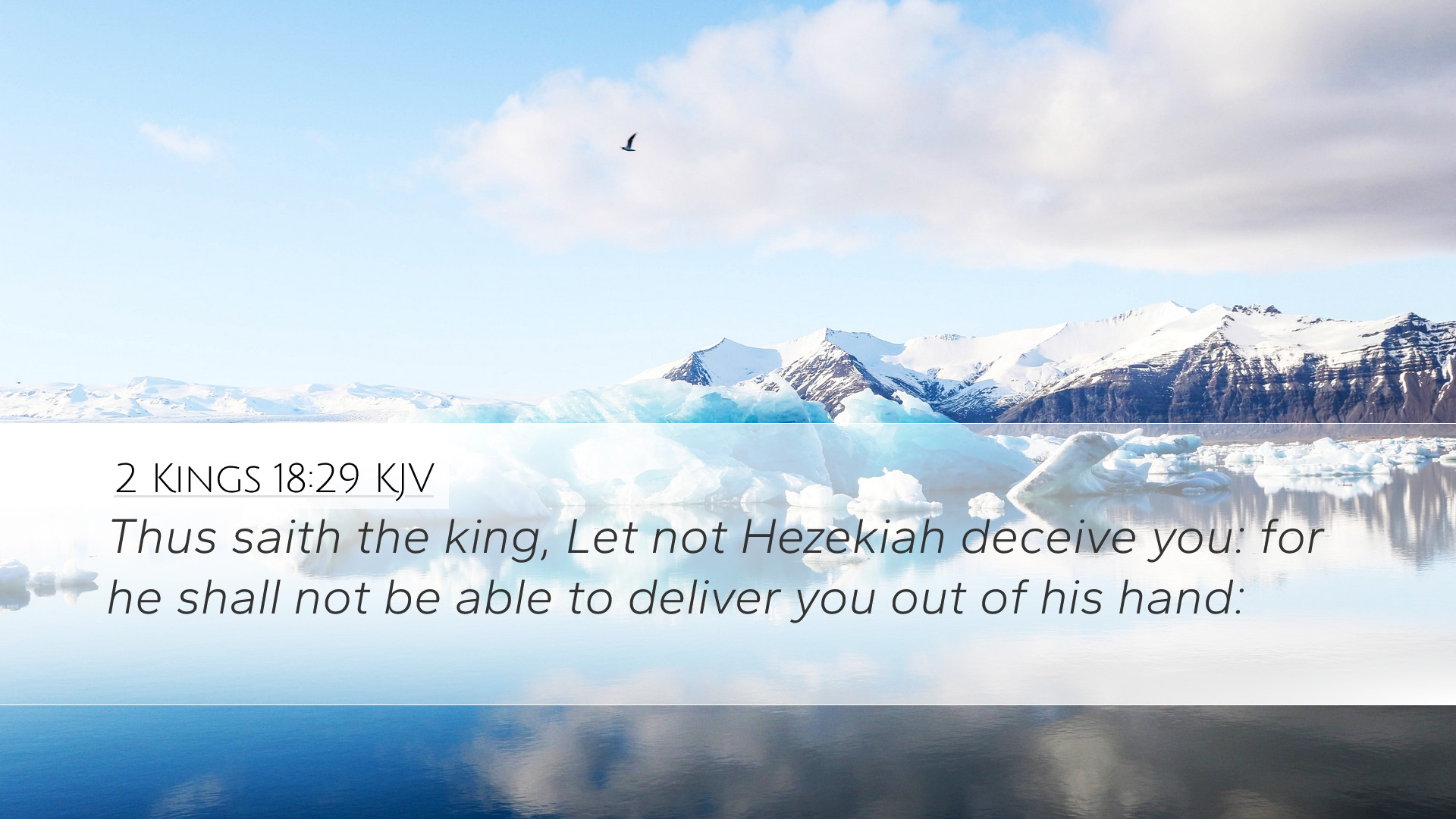Commentary on 2 Kings 18:29
Verse Text: "Thus says the king: ‘Do not let Hezekiah deceive you, for he will not be able to deliver you.’"
Introduction
The verse 2 Kings 18:29 is a critical proclamation made by King Sennacherib of Assyria through his messenger, Rabshakeh, directed toward the people of Judah during the reign of King Hezekiah. This statement reflects the overarching themes of faith, skepticism, and the power struggle between the Assyrian Empire and the Kingdom of Judah.
Contextual Background
This passage is set within the historical narrative of Judah's encounter with the Assyrian threat. Hezekiah, a reformist king, sought to lead Judah back to faithful worship of Yahweh amidst a backdrop of apostasy. The Assyrians, known for their military prowess, were rapidly advancing, and their challenge was not only physical but also deeply ideological.
Theological Significance
The statement by Sennacherib represents a profound challenge to Hezekiah's leadership and the faith of the people. It poses a theological question regarding the ability of God to save and protect His people.
- Challenge to Faith: Sennacherib's message was a direct assault on the faith of Hezekiah and his subjects. By asserting that Hezekiah could not deliver them, he was undermining the belief in divine protection.
- Nature of Trust in God: Hezekiah, who had encouraged the people to place their trust in God, faced an enormous test. The critique by Assyria shows the tension between divine faithfulness and visible threats.
Commentary Insights
Matthew Henry's Commentary: Henry interprets Sennacherib's message as a grim taunt laden with mockery. He notes the psychological warfare employed by the Assyrians, emphasizing their intention to sow doubt among the beleaguered inhabitants of Jerusalem. Henry points out that while the Assyrians seemed invincible, the true invincibility lies with God.
Albert Barnes' Notes: Barnes underscores the notion that the Assyrian perspective reflects a misunderstanding of God's sovereignty. He states that the confidence of the Assyrians is misplaced, as their power pales in comparison to the might of the Lord. Barnes emphasizes the importance of looking beyond immediate threats to the overarching faithfulness of God towards His covenant people.
Adam Clarke's Commentary: Clarke analyzes the historical context, remarking that Rabshakeh's words were intended to demoralize the people and persuade them to surrender. Clarke suggests that this moment serves as an illustration of how external pressures can challenge one's faith but also reinforces the necessity of steadfastness in belief amidst adversity.
Practical Applications
This verse and its explication yield significant lessons for contemporary readers:
- Enduring Trials with Faith: Just as Hezekiah encouraged courage and faith, modern believers are called to stand firm in their reliance on God's promises, even when confronted with daunting challenges.
- The Power of God Over Adversity: Recognizing that worldly powers may boast of superiority but are ultimately subject to God's authority provides solace and strength to believers.
- Encouragement in Leadership: For leaders within the church, understanding the dynamics of faith and doubt can guide how they support their communities during distressing times.
Conclusion
2 Kings 18:29 serves as both a historical account and a poignant reminder of the vital interplay between faith and fear. As King Hezekiah exemplifies the struggle to maintain faith amidst external threats, believers today are reminded of God’s ultimate sovereignty and faithfulness. The insights from notable commentators like Matthew Henry, Albert Barnes, and Adam Clarke provide depth and understanding to this verse, offering guidance and encouragement to pastors, students, theologians, and scholars as they navigate their own challenges of faith in a complex world.


